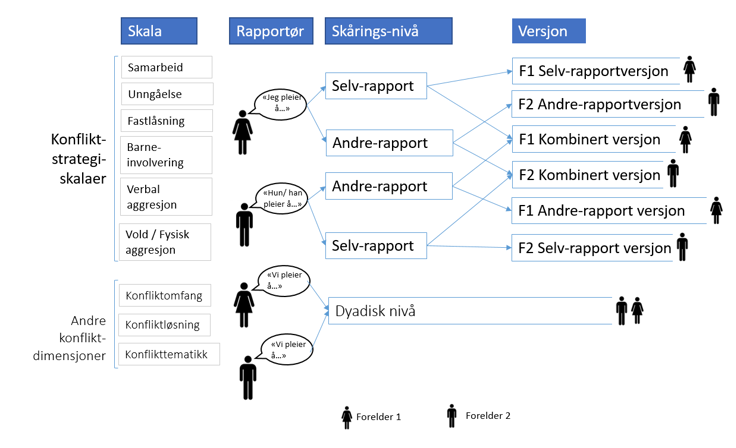Recommends a new Short-form of the CPS Strategy Scales
Article
|Published
In this paper we translated the CPS Strategy Scales into Norwegian, developed a short-form and validated this short-form across family structures. The new short-form was found to have better psychometric properties compared to the original Strategy scales, and we recommend it for use in research and psychological practice.
Meaningful and validated instruments are necessary to enable investigations of interparental conflicts in order to provide targeted help for families or develop new knowledge. Scales that are translated and validated in the Nordic countries are however rare, and this may have hindered investigations of this important aspect of family life in research and practice. FamilieForSK has therefore worked for several years to find, translate and validate interparental conflict scales for use in Norway.
A considerable body of research has emphasized the negative impact of interparental conflict on parents. Importantly, the impact on children varies depending on how parents express and manage conflicts rather than by the mere frequency of conflicts per se. This calls for instruments tapping the qualities of interparental conflict behaviours. The Strategy scales from the Conflicts and Problem-solving Scales is widely used and clinically meaningful as it distinguishes between six different conflict behaviours: Cooperation, tapping ways to approach the other in cooperative ways; avoidance, tapping attempts to escape arguments; child involvement, tapping ways to involve the children in parental conflict; stalemating, tapping conflict behaviours characterized by unresolved hostility, distress, and disengagement; verbal aggression, tapping aggressive expressions such as cursing, accusing or yelling; and physical aggression, reflecting threats or inflictions of harm to the other parent. An important advantage of the scale is the inclusion of both self- and coparent report of typical conflict behaviours, enabling a more nuanced picture of the interparental conflict dynamics. In addition, both reliability and validity may vary between self- and coparent-reported conflict behaviours. Being able to include both perspectives is therefore an advantage.
Less than half of the items (i.e., 18 out of 44) were included in the new Strategy short-form. This is an important advantage, as there is generally a need for scales that are more concise to foster greater utility in both research studies and clinical practice.
Another important contribution of this paper, is the validation of the new short-form across family structures. Coparent relationships today take many forms, and children are affected by interparental conflicts independently of family structures. As the CPS was originally developed and tested in a sample of married parents, it is therefore an important contribution to have confirmed that the new short-form is applicable both in families where parents live together and where they live apart.
The paper is published in Journal of Family Studies. The work with this paper was funded by The Norwegian Research Council and by The Norwegian Directorate of Children, Youth and Family Affairs.

The figure shows a schematic overview of CPS including six Conflict Strategy scales and four other Conflict Dimension scales
You can read the entire paper by clicking the link in the reference:
Reference
Maren Sand Helland, Tonje Holt, Kristin Gustavson, Linda Larsen & Espen Røysamb (2021) Validation and short-form development of Conflict and Problem-solving Strategy Scales, Journal of Family Studies, DOI: 10.1080/13229400.2021.1981977


